Would you like to eat healthy and delicious meals on a regular basis but cannot find the time or energy to spend hours in the kitchen daily? If so, you might want to look into plant-based meal prep.
It’s a really helpful habit to get into and has become a pretty big diet and food trend! From those who are trying to eat healthier homemade meals to busy moms on a budget, meal prep is a wonderful and versatile hack we can all make use of.
No need for lots of fancy kitchen equipment, extra money or tons of time! Plant-based meal prep can work for everyone, no matter if you’re batch cooking individual components or crafting whole meals in advance.
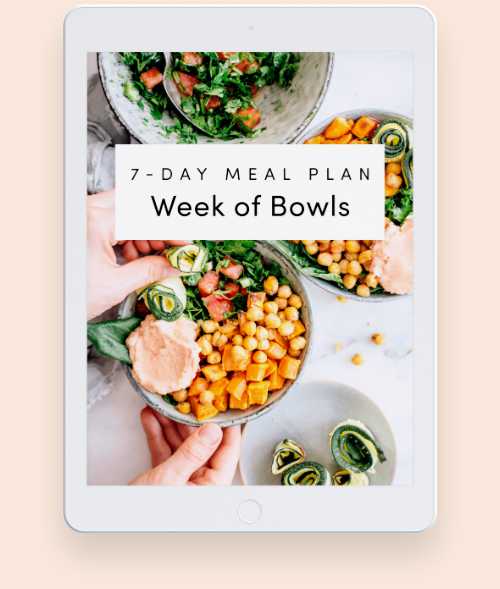
free 7-day vegan meal plan
Your next week of eating is planned out with these quick and delicious vegan bowls, meal prepping steps & full grocery list.
Especially for vegan newbies, a laid-out vegan meal plan with easy prep sessions is a fantastic way to learn what a healthy vegan diet looks like. We have found that creating versatile vegan bowls is super easy if you implement plant-based meal prepping!
This article is meant to give you a quick but thorough overview of what meal prep is, who it’s perfect for and what you need to streamline the whole process.
We’ll also share with you what components can be used to create healthy and delicious vegan meals, our top starter tips and ways of customizing meal plans to make them work for you personally.
You can find over 55 hand-selected vegan meal prep recipes here and browse our vegan salad dressings, vegan wraps and vegan bliss balls for more ideas. If you’re new to cooking, find out beginner’s guide here.
Be sure to check out our 1-week vegan meal plan (including free downloadable eBook) to see how meal prep can be implemented!
Getting excited? Great, then let’s get into things and see if plant-based meal prep is for you.
This post contains affiliate links. As an Amazon Associate we earn from qualifying purchases.
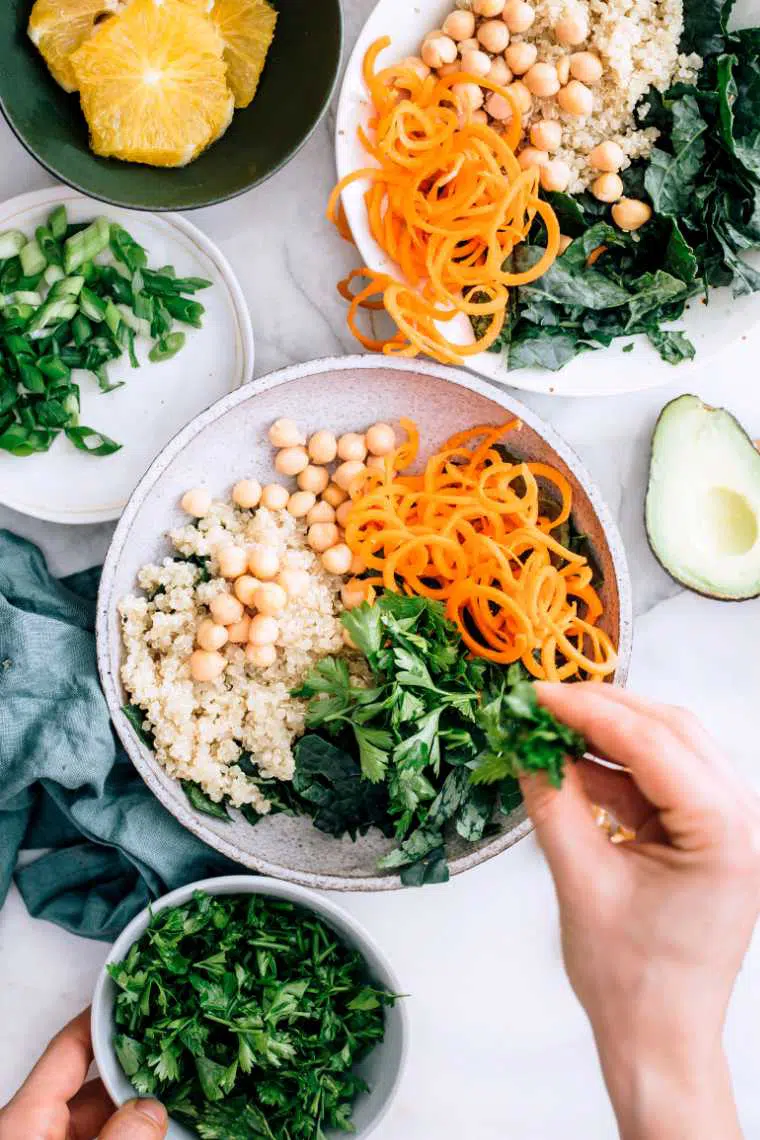
What Is Plant-Based Meal Prep?
According to The Kitchn, meal prep (short for meal preparation) is basically dedicating a block of time to batch-cook ingredients or meals for the week ahead. This step can make mealtimes much easier for the coming days!
From weighing and measuring your portions to chopping or peeling veggies and blending a quick sauce, your preparation can include either individual components or even involve cooking large batches of meals to eat over a few days.
However, meal prep isn’t one-size-fits-all. Everyone has different nutritional needs and taste preferences. Down below, we’ll share with you how you can adjust any meal plan or prep to make it work best for you!
Meal prepping goes hand in hand with meal planning because you should at least have a rough vision of what you want to eat for the upcoming days. Don’t just try to wing it at the grocery store.
Another option is to choose either breakfast, lunch or dinner to prep for the following week. That way, you can tackle your personal mealtime pain points and needs!
If you want to avoid grabbing lunch outside, make some plant-based bowls to take with you in the morning. If cooking dinner after a long day seems downright impossible to you, heat up a serving of your prepped chili.
A little bit of planning goes a long way to making a hectic work week a little less stressful! And spending some time once or twice per week to prepare a batch of food for the coming days that can be turned into delicious meals with little extra effort is just super convenient.
Who Meal Prep is Great For
- Full-time workers who need their daily lunches to-go
- Parents who want to send their kids to school with healthy meals
- Singles who don’t want to cook just one portion for themselves all the time
- Students who need something in between classes or don’t have access to a proper kitchen
- Health foodies who want their meals more readily available
- Plant-based beginners who aren’t used to preparing their own food
- People who aren’t into following full-on recipes each day
- Anyone who’s on a budget or looking to reduce their food waste
- Those who fall off the wagon easily because of inconvenience or lack of motivation
Of course, meal prep is not for everyone. Some people like to decide what they want to eat on a day-to-day basis, whilst others simply enjoy cooking or want their food to be freshly cooked each time.
If that’s you, it’s better to just have your favorite staple foods at home and buy additional fresh ingredients depending on what you feel like.
However, we get a ton of requests for easy ways to eat more healthy plant-based meals — so if you’re one of those people, we’re sure we can inspire you to at least get into prepping individual meal components.
Home-cooked food each day and even healthy packed lunches for the week with no need to stand in the kitchen for hours on end — doesn’t that sound really appealing?
Especially for those who are transitioning to a vegan diet or who are veg-curious, following an approachable meal plan can make this transition so much easier!
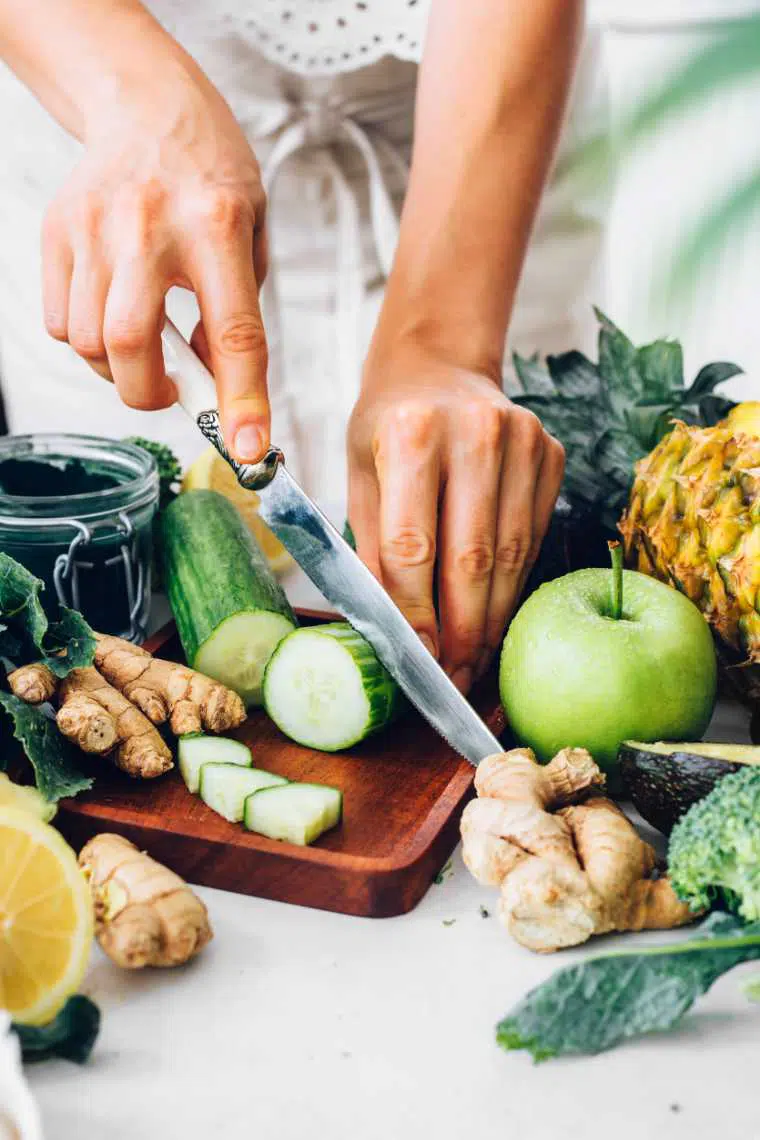
Benefits of Meal Prepping
By dedicating just a couple of hours to prepare all of your dishes for the week, you can be sure that delicious, healthy meals will never be more than ten minutes away.
This frees up a lot of brain space and helps prevent decision fatigue. You won’t have to deliberate about what to eat after a busy day at work or spend large amounts of time in the kitchen.
It can, therefore, help you stick to a healthy lifestyle when you’re tired and your willpower would normally go out of the window.
Meal prep also helps keep grocery costs down and reduces food waste. You only buy exactly what you’re going to eat, meaning you’ll throw away less food and help your budget stretch further.
Top Benefits in a Nutshell
We love that even tiny meal preps help create healthy habits, which in turn make following a nutritious and enjoyable diet much easier. Here’s what else we love about it!
- Supports a healthy well-balanced diet
- Ensures you get all essential nutrients
- Reduces food waste and stress
- Less planning, more great food at your fingertips
- Lower grocery bills
- Way less cleaning up in the kitchen
- Perfect for beginners who want to learn what a vegan diet looks like
- Weight loss goals are much more easily achieved
- Efficient use of time
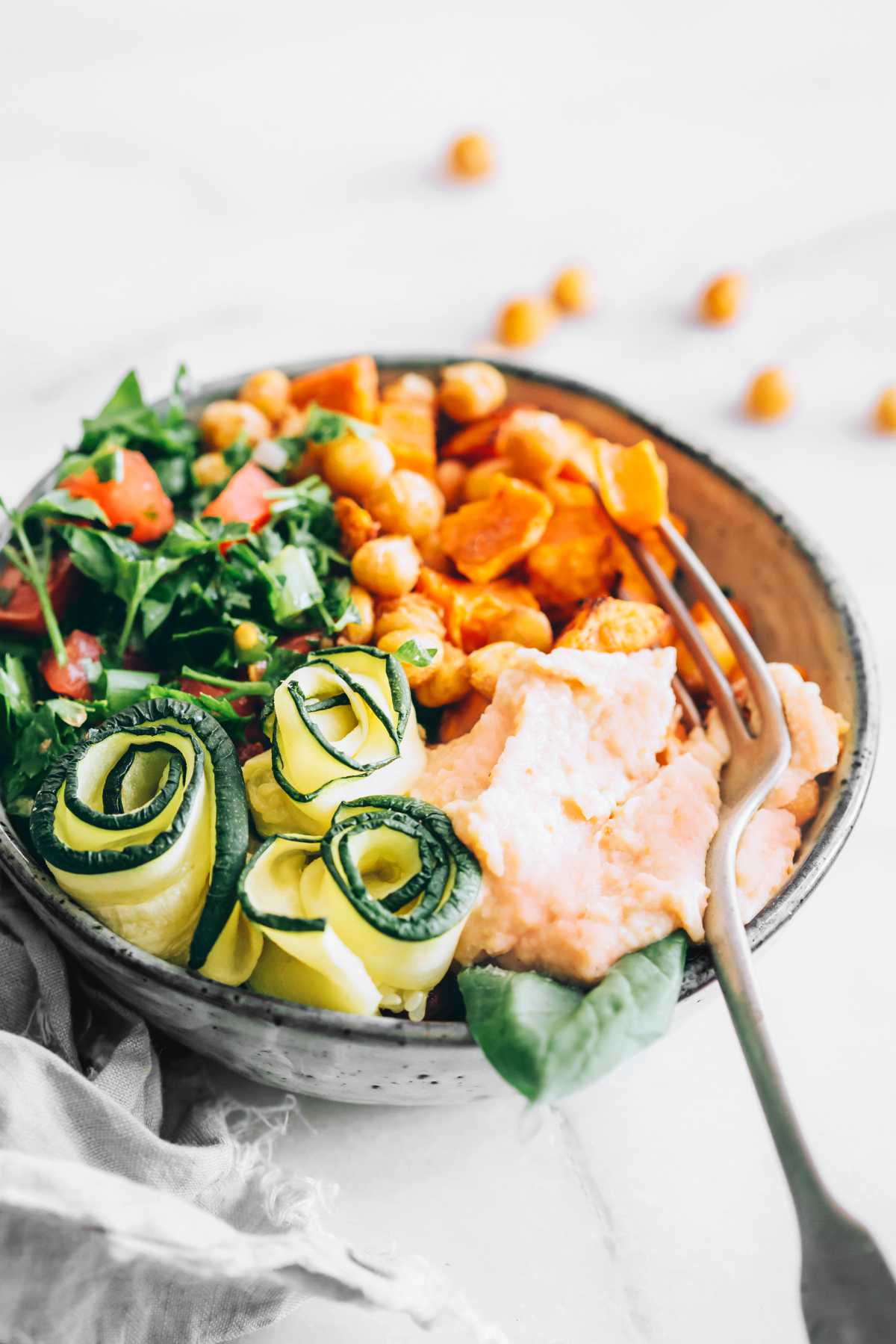
Creating Plant-Based Meals
One key to easy, nutritious and tasty vegan meals is to know which components to use, from go-to vegan staple foods to delicious add-ons!
Choosing from all the main food groups for most of your meals is a great way to create both healthy and satisfying dishes. Here’s what this can look like.
Vegan Meal Components
- Starches — rice, whole grain pasta, quinoa, buckwheat, millet, potatoes, sweet potatoes, pumpkin, whole grain bread
- Vegetables — broccoli, kale, spinach, zucchini, collards, green beans, bell peppers, eggplant, carrots, mushrooms, tomatoes, leafy greens
- Legumes — tofu, tempeh, beans, lentils, peas
- Healthy Fats — nuts, seeds, avocado, nut or seed butter
- Condiments — seasonings, herbs, dressings, sauces, dried or fresh fruit
Building off these simple yet delicious and wholesome foods enables you to load up on essential nutrients while keeping your grocery bills low.
Now, let’s go over some tips on how to get the most out of your meal prep. It may take a few weeks to get the hang of things, but eventually, you’ll know what you enjoy most and how much you like to eat at each mealtime.
Nutrients on a Plant-Based Diet
Here’s a quick overview of potentially critical nutrients on a plant-based diet and common food sources:
- Calcium: green vegetables, oranges, tahini, calcium-fortified soy milk and tofu
- Iron: oats, spinach, dried figs, lentils, tahini, chickpeas
- Zinc: oats, chickpeas, lentils, tofu, pumpkin seeds, almonds
- Iodine: nori or dulse seaweed, iodized salt
- Omega-3: flax seeds, chia seeds, hemp seeds, walnuts
- Vitamin D: sun exposure, some UV-light grown mushrooms, supplement
- Vitamin B12: fortified food, supplements
Read more about supplementation with vitamin B12 here, and feel free to check our in-depth guide on vegan nutrition.
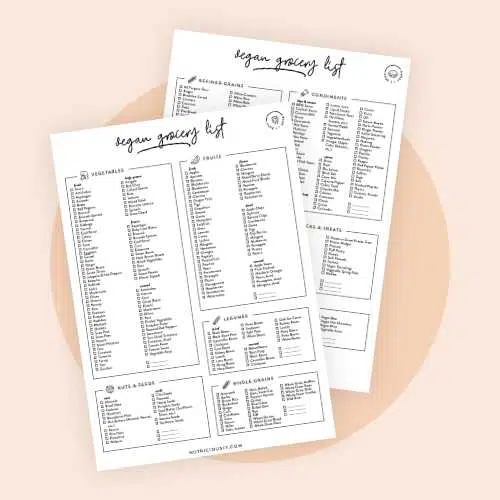
download our free printable vegan grocery list
Grab your free PDF and sign up for our newsletter by entering your email below!
Meal Prep Tips For Beginners
Changing your diet or starting to cook more of your own meals can seem intimidating at first, but once you get the hang of which foods to buy and prepare on a regular basis, a delicious meal or snack is never far away — and you’ll be happy to wave goodbye to daily takeouts.
Simply take advantage of some free time during the weekend — anywhere from 15 minutes to two hours, depending on how much food you want to prepare.
You can also meal prep twice a week (Saturday and Wednesday, for example) to increase the variety and freshness of foods.
Put on your favorite show, podcast or music and get washing, chopping and cooking. Before you know it, you’ll be relishing this time you get to kick back and relax in the kitchen.
Every endeavor comes with a learning curve, so here are our most important insights and tips to help you succeed quickly!
Planning Is Key
Think about a few meals you want to make over the next few days and jot down the parts you can prep — from washing or chopping veggies to roasting chickpeas or nuts, making a batch of rice or whipping up a quick dressing.
Start with 2-3 recipes per week if you don’t have a plan to follow like the one we’ll share with you at the end of the article. Don’t just wing it at the store!
Get Comfortable With Multitasking
Following a meal prep plan can take half an hour or two hours — the key is to be smart about your steps.
We like to start by cooking our grains or legumes while preheating the oven, then baking our sweet potatoes and veggies while chopping salad greens and whisking together an easy sauce. Doing everything in that order means that you’ll be done in an hour tops!
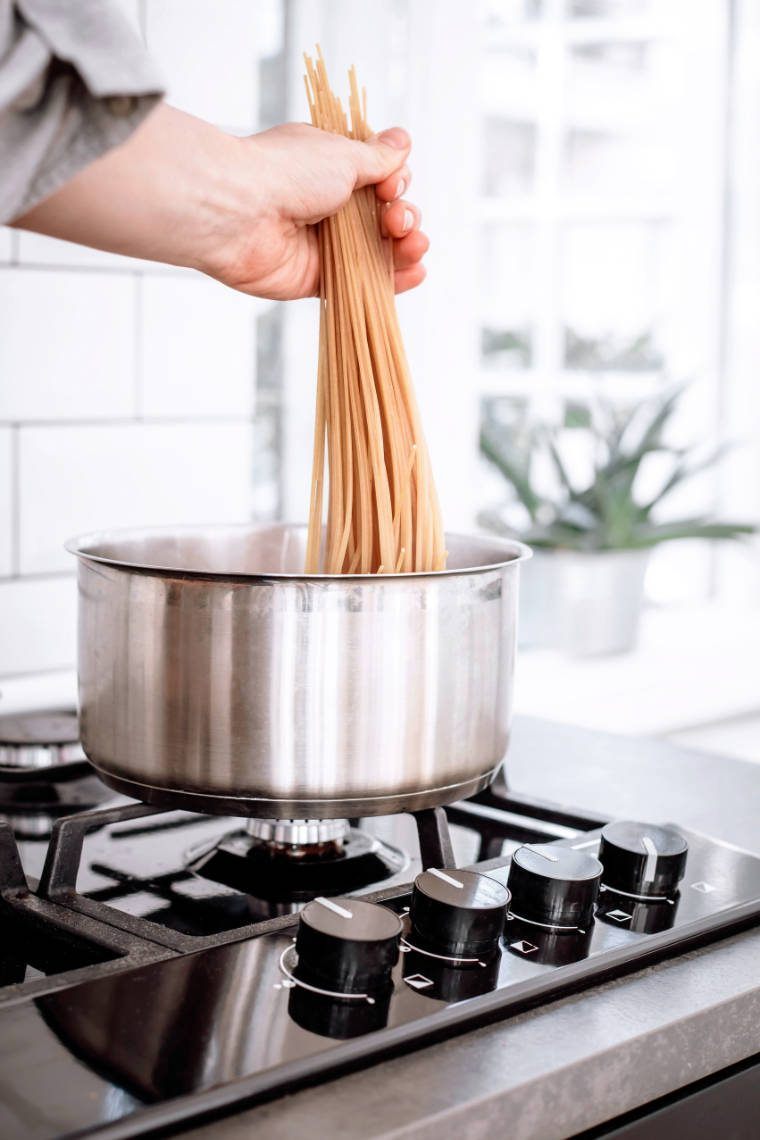
Ingredient Prep or Meal Prep?
You can either make larger batches of rice, potatoes, hummus and roasted veggies (which would be prepping your ingredients), or you can prep whole meals!
This can take the form of bean chilis, veggie curries, overnight oats or energy bars. Find great recipe examples that work well for meal prepping below.
Don’t Overprep
Not only can prepping too much food be overwhelming when you’re doing it, but you may also end up with spoilt food if you don’t manage to eat all of it quickly enough!
Think about freezing some of the food so it lasts longer and can be defrosted the night before you plan on eating it. Having too much prepared food in your fridge could also lead to overeating, and it takes away some of the flexibility during the week.
Use Frozen Produce
Frozen fruits and vegetables are a great buy, as they are often very cheap, fresh and pack a lot of nutrients.
They’ll also keep a long time in the freezer and are quick to prepare — no trimming or chopping required! Good things to buy frozen include berries, cherries, mangoes, broccoli, cauliflower, peas and root veg (like butternut squash).
Store Separately
Don’t make the mistake of adding salad dressing over your fresh greens just to end up with a soggy mess when you’re ready to dig in the next day!
Some components need to be stored separately, like freshly prepared salads, chopped fruit or cooked grains. If you end up with several containers, jars or bags of prepped food, think about labeling them so you remember what’s inside.
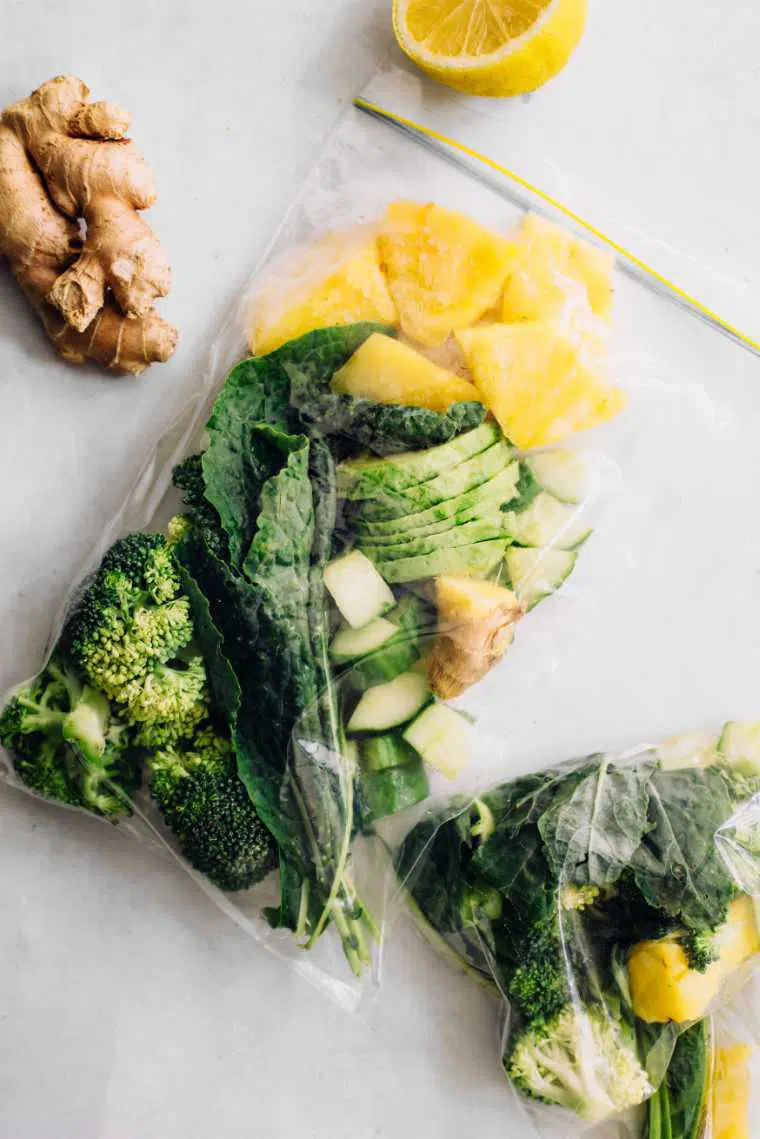
Room for Variety & Flexibility
If you get bored by eating the same meals a couple of times in a row, only prep the basic components and add different fresh veggies, chopped nuts or fresh herbs to your dishes once you put them together!
Some people like to just meal prep for weeknights and eat whatever they want during the weekend. If you want more flexibility, that’s a great idea! However, if you want to stay on a budget and follow a healthy diet, it can be better to stick to a clear plan.
Food Safety Guidelines
According to the FDA Food Code, all perishable foods that are opened or prepared should be thrown out after 7 days, maximum.
Some of it doesn’t last that long (looking at you, high protein foods!) and you should definitely do a good old smell test or look for visible signs that food is spoiled before tasting it. Reheat your food thoroughly before eating it and let it cool completely before placing it in the fridge.
If you want to store it for more than a week, definitely freeze your food — and let it defrost at room temperature for a couple of hours before consuming it.
Good Meal Prep Equipment
Honestly, you can make meal prepping work with just basic kitchen equipment, most of which you probably already have at home.
But to give you an idea of how to streamline your meal prep session, we want to provide a quick overview of the best tools.
Basic Kitchen Tools
- Blender
- Baking sheets
- Parchment paper or silicone mats
- Cutting board
- Knives
- Non-stick pan
- Food processor
- Instant Pot (for safe hands-off batch cooking; perfect for grains, legumes and stews)
The last three items are more of a “nice-to-have” but all of these tools can make preparing healthy and delicious meals a breeze!
Food Storage Equipment
- Plastic Food Containers or Tupperware: Your basic storage containers. Choose BPA-free, microwave and dishwasher-safe.
- Glass Jars or Boxes: If you prefer glass over plastic, this is your best option for basic storage.
- Bento-Style Boxes or Lunch-Boxes: These are awesome for packing meals where you’d like to keep different foods separate.
- Ziploc-Style Food Bags: These can be used in the fridge or freezer, reusing them multiple times.
Shop These Products




What Are Good Meal Prep Recipes?
There are so many recipes that work beautifully for meal prepping! Here are some of our favorites.
- Soups & Stews
- Casseroles
- Bean Chilis
- Veggie Curries
- Bean Patties or Balls
- Potato Salad
- Mason Jar Salad
- Chia Pudding
- Homemade Vegan Granola
- Frozen Smoothie Packs
- Overnight Oats
- Bliss Balls
- Breakfast Bars
Some signs that a particular recipe or meal is good for prepping ahead of time are that it includes steps like chopping veggies or boiling rice and that it keeps well in the fridge for a few days.
Generally, recipes that can be scaled and prepared in larger batches can be eaten over the course of a couple of days — which is kind of the ultimate meal prep.
We personally love to create mix-and-match plant-based bowls where we can prepare a few of the compounds ahead of time and just quickly heat up whatever seasonal vegetables we have in the fridge to go along with the rest.
1-Week Vegan Meal Plan & Prep
Intrigued by plant-based meal prep? Download our free 7-day vegan meal plan which includes a 1-hr prepping part so you’ll see what it’s like to have pre-made meal components at hand.
Create 7 individual and delicious vegan nourish bowls at home made from simple ingredients and set up in a way to allow for leftover lunches the next day!
The 50-page eBook includes detailed instructions, a full shopping list, kitchen guide, going vegan tips and more — click below to download.

free 7-day vegan meal plan
Your next week of eating is planned out with these quick and delicious vegan bowls, meal prepping steps & full grocery list.
More Plant-Based Diet Guides
If you liked this plant-based meal prep article, be sure to check out the following guides next!
- Whole Food Plant-Based Diet Guide
- How to Make Bliss Balls
- Plant-Based Weight Loss Guide
- Easy Vegan Food Swaps
- Vegan Breakfast Guide + Recipes
We hope you enjoyed this guide on plant-based meal prep! Let us know in the comments below if you tried any recipes and downloaded our free eBook. You can also Pin this article here and tag us on IG!

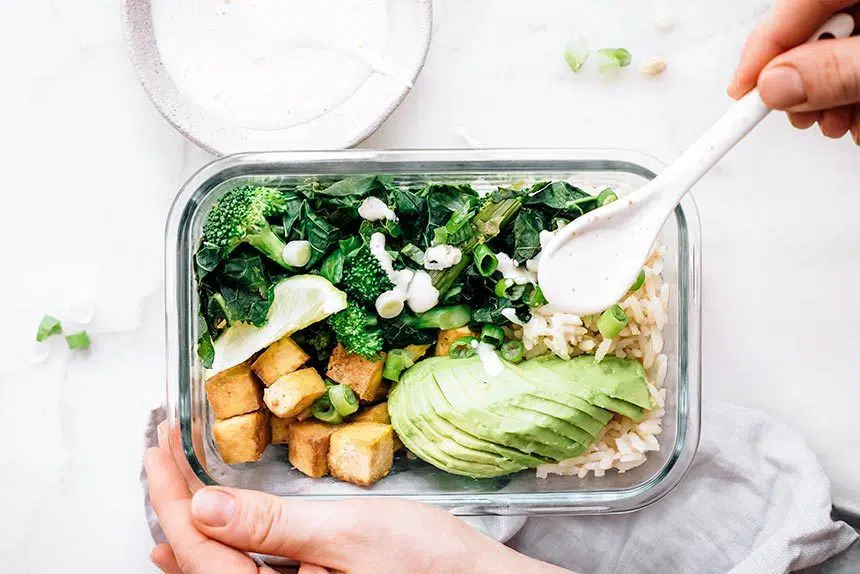
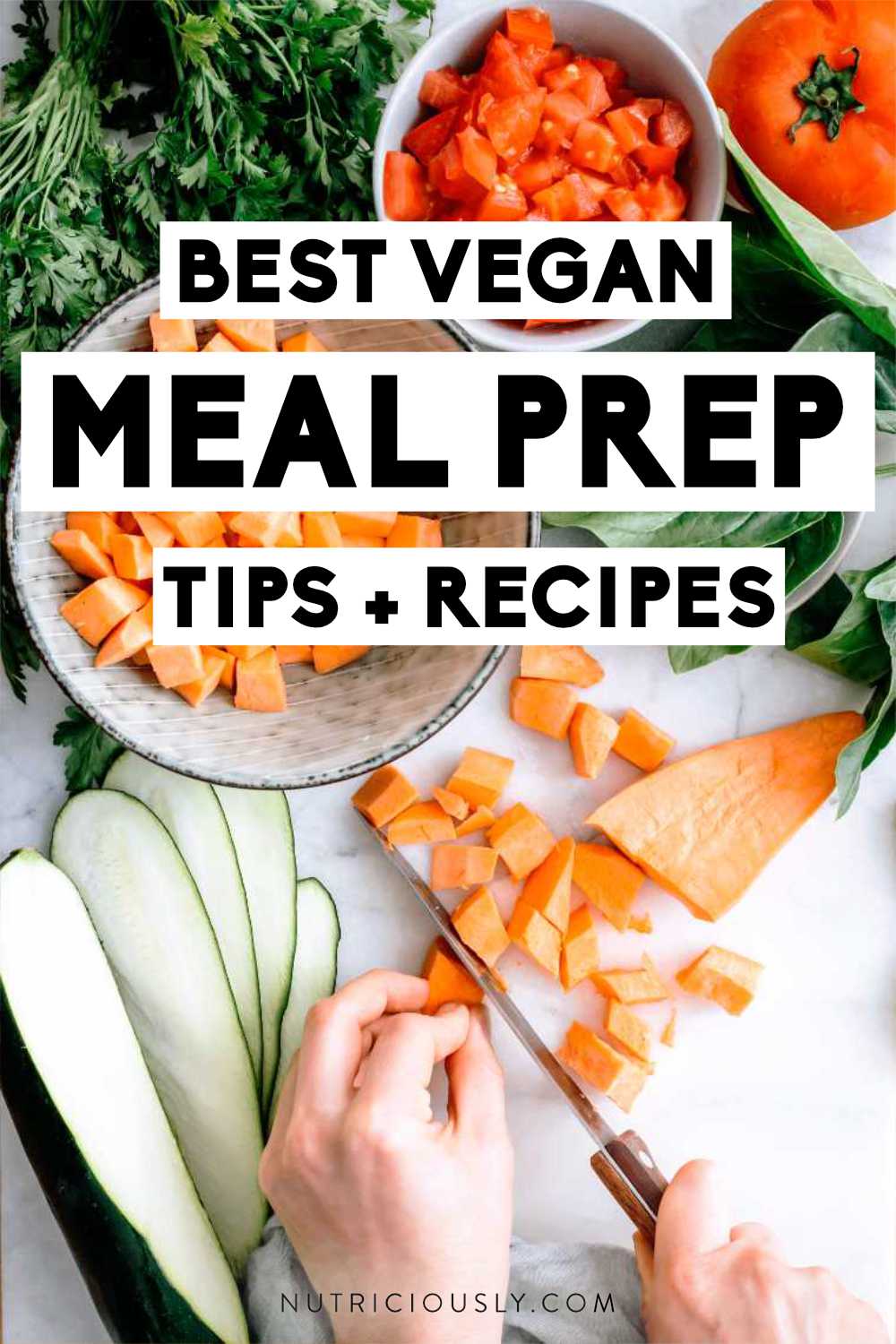
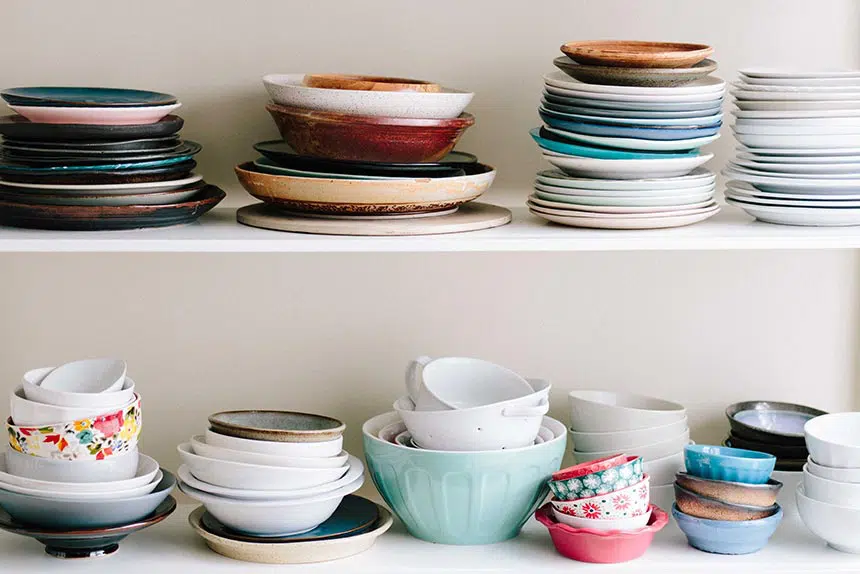
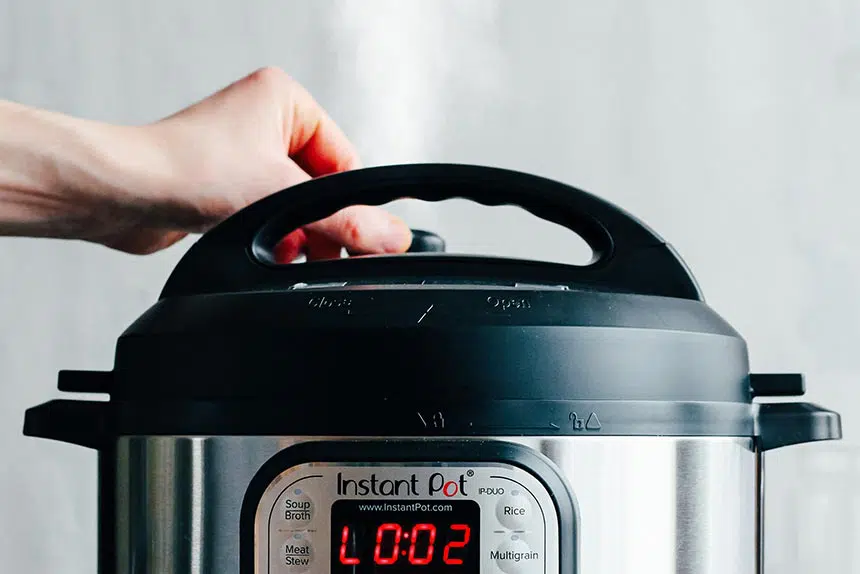
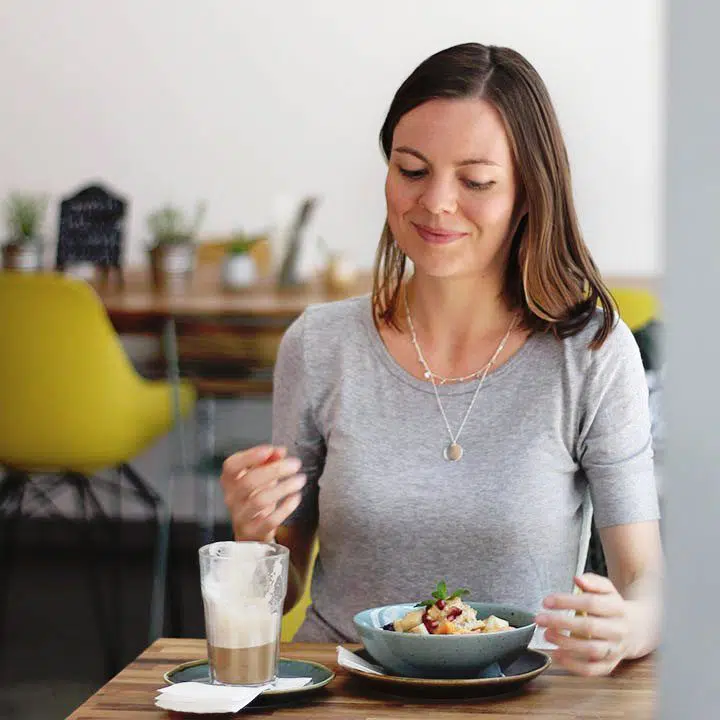
 Alena Schowalter is a Certified Vegan Nutritionist who has been a vegetarian since childhood and vegan since 2012. Together with her husband, she founded nutriciously in 2015 and has been guiding thousands of people through different transition stages towards a healthy plant-based diet. She’s received training in the fields of nutrition, music therapy and social work. Alena enjoys discussions around vegan ethics, walks through nature and creating new recipes.
Alena Schowalter is a Certified Vegan Nutritionist who has been a vegetarian since childhood and vegan since 2012. Together with her husband, she founded nutriciously in 2015 and has been guiding thousands of people through different transition stages towards a healthy plant-based diet. She’s received training in the fields of nutrition, music therapy and social work. Alena enjoys discussions around vegan ethics, walks through nature and creating new recipes.
New to a vegan diet? These plant-based meal prep tips are perfect for beginners and those who want to save some time and money in the kitchen! Find easy recipes, customization ideas & real-life advice here.